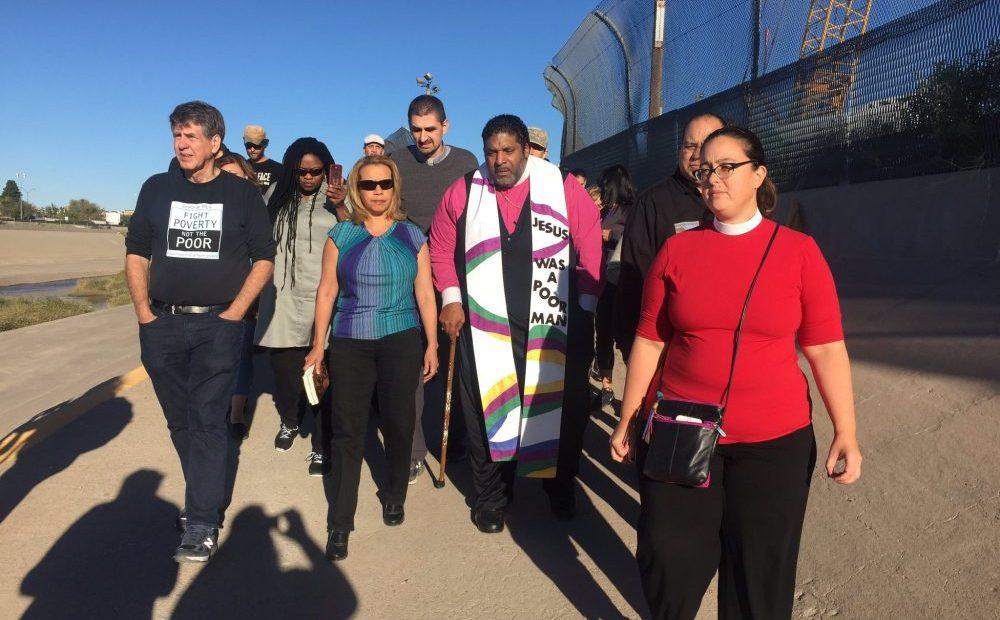
Read The Guardian’s profile today on Rev. Dr. William J. Barber II, the organizing of the Poor People’s Campaign: A National Call for Moral Revival, and why we need such an ambitious and broad Campaign to unite the dispossessed across this country:
Chicago is the eighth stop on the pastor’s exhaustive tour of 14 states, laying the foundations for a new Poor People’s Campaign – the last movement of the civil rights era, which effectively ended after King’s death. The 1968 campaign attempted to push Congress into passing an economic bill of rights including a package of guaranteed income, equitable housing and funds for poor communities. But, this time around, with the new campaign still in its infancy, the aim is broader: to unite the disenfranchised groups in the US – across the spectrums of race and sexuality – under a common cause.
“We have to remember that the civil rights movement did not just end,” says Barber before the evening service. “It was assassinated by killing the leaders, it was assassinated through division. Throughout our trips, what we’re finding is there is still a need for that coalition that Dr King talked about in ’68 in coming together to address the evils of racism, militarism, systemic poverty and ecological devastation.”
We were driving through the streets of Chicago’s West Side as the sun was setting, and Barber’s point was perhaps best made simply by looking out of the window on to some of the city’s poorest neighbourhoods. Fifty years after King came to Stone Temple Baptist church as part of his campaign against slum housing, some areas here still have a poverty rate of 60%. In a neighbourhood a few miles from the church, the life expectancy is just 69 years.
“Some issues are not about left and right, Republican and Democrat – they’re about our deepest moral values,” says Barber. “And we believe that you have to have a campaign, a movement, that seeks to reshape the moral narrative.”
The pastor has spent the past four years as the backbone of the Moral Mondays campaign in North Carolina, a civil disobedience movement that ballooned after fighting a series of state voter suppression laws, which disproportionately affected poor people of colour. The movement now covers a broad range of progressive issues.
The sustained campaign began commanding national attention when, every Monday, scores of protesters started entering the state capitol building and laying their bodies down for arrest. More than 900 people were arrested throughout the campaign; Barber has lost count of how many times he was placed in handcuffs.
The movement scored major victories, culminating in a supreme court decision ruling state voter laws unconstitutional, and the unseating of the Republican governor Pat McCrory in 2016.
The Chicago service had begun earlier with gospel songs from the civil rights era and testimony from some of the disenfranchised groups Barber hopes to galvanise: an Afghanistan war veteran suffering from PTSD; an environmental activist fighting pollution of the Calumet river; and 27-year-old Ashley Mesch, a care worker for the elderly who is paid poverty-line wages of $10.10 (£7.66) an hour and who struggles to support her family.
Mesch recently joined the local Fight for $15 movement, which was dealt a blow earlier in the year when Bruce Rauner, the Republican governor of Illinois, blocked state legislation to raise the minimum wage to $15. After hearing Barber’s sermon, Mesch says she is ready to put her body on the line and take part in her first direct action next year.
“Hearing the reverend was rejuvenating,” she says. “I’m absolutely ready to do anything that needs to be done. I might get arrested, but people need to hear the message.”
Barber – who co-chairs the campaign with the Rev Dr Liz Theoharis, a pastor from New York City – hopes to sign up 1,000 people in 25 states and DC for a season of civil disobedience in the spring of next year. Protesters will stage sit-ins at state capitols and in the US Congress under a “moral agenda” encompassing a host of issues, from LGBTQ and voting rights to immigration reform and access to healthcare. The campaign will not say yet how many people have signed up, but it has partnered with dozens of local groups across the country to avoid what Barber describes as “helicopter leadership”. “Liz and I are almost like a travelling course of theology and public activism, and then we turn it over to the anchor groups in each of the states,” he says.
It is perhaps the most ambitious civil rights campaign since the 60s, and will be underpinned by Barber’s work in North Carolina, where he served as president of the NAACP state chapter for more than a decade before resigning earlier in the year to take on this national role.
Read the rest of the piece here. For more articles on recent stops of the Campaign in El Paso and beyond, as well as video footage and other media, check out the Past Events page of the Poor People’s Campaign: A National Call for Moral Revival website.